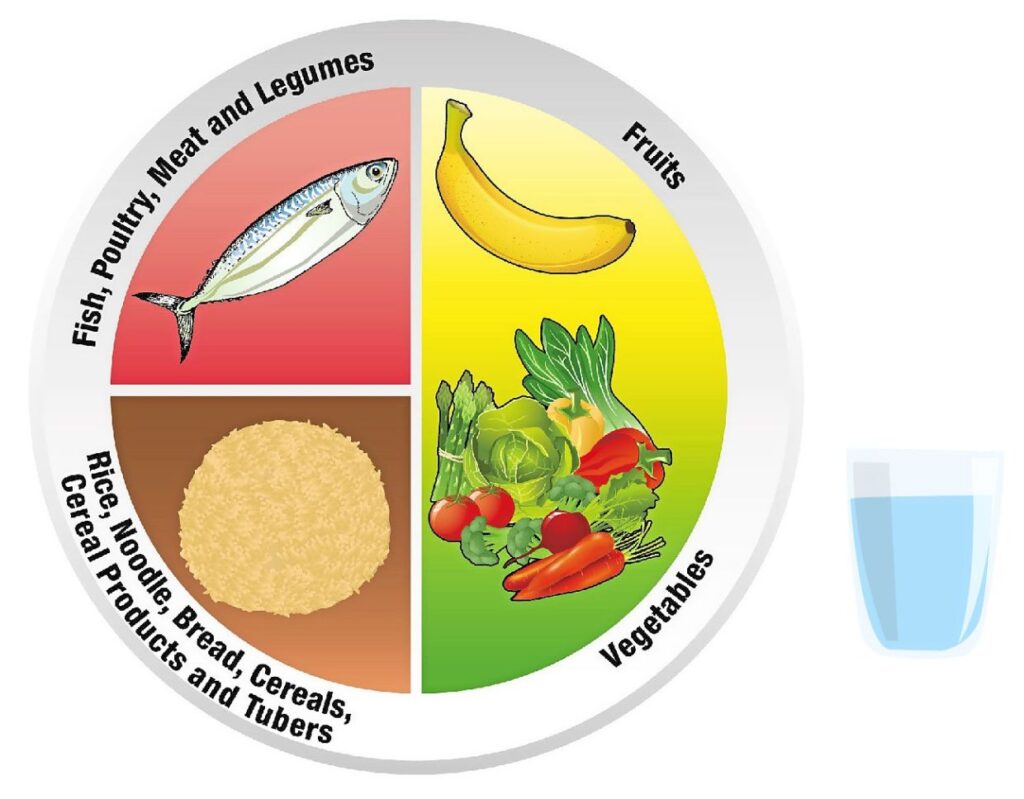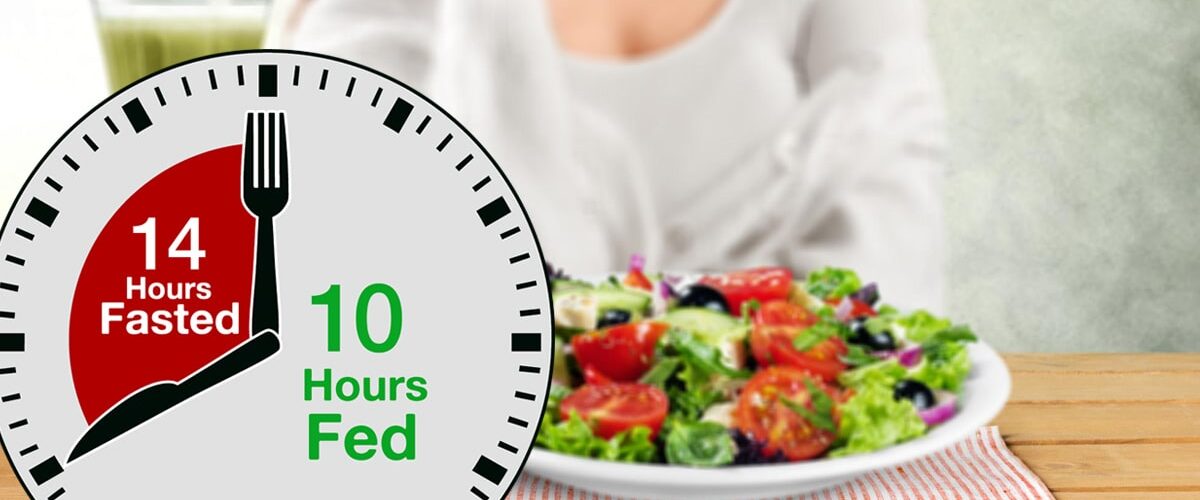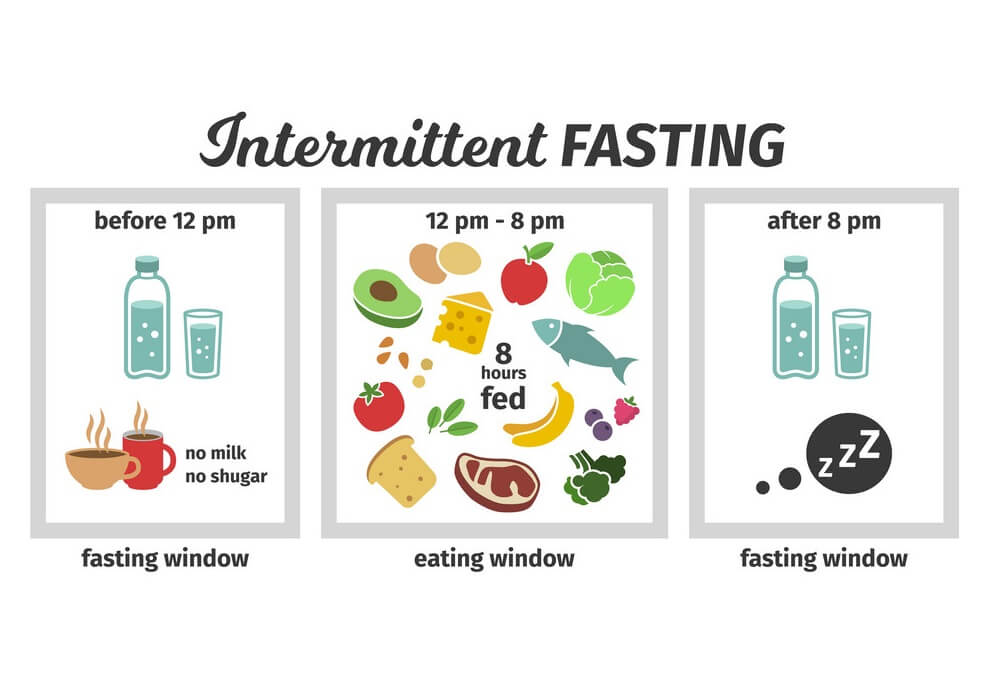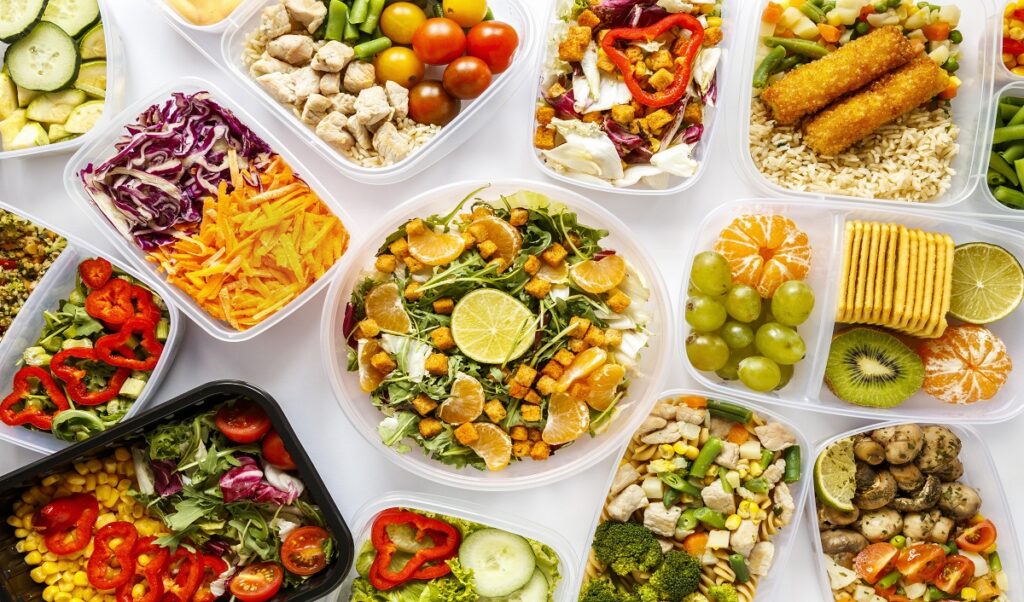Fasting has always been known as a religious thing; it was claimed to have a soul-and-mind cleansing effect by rejecting food or its particular types for a certain amount of time. However, now this system has changed and is widely used by people wanting to lose weight. Intermittent fasting is a specific kind of eating pattern that defines your eating-fasting hours and is stated to be helpful in terms of health and weight. We will look into the benefits and side effects of intermittent fasting for weight loss.
Page Contents
A Glimpse At An Intermittent Fasting
Intermittent fasting is presented in various eating-fasting options, setting up quite restricted time limits[1]:
5:2 Fasting
The most popular option, as it’s the least severe and offers 5 days of regular and balanced nutrition, and 2 days of reduced calorie consumption – around 500 calories. It’s important to have a balanced diet for 5 days, not to gorge, making up for the 2 days reduction. Besides, you are free to choose the days you want, according to your biorhythms and working schedule.
Time-restricted fasting
This option offers an individual choice of eating window. Typically it’s 8-10 hours. So basically, you set the time from 8 a.m. to 5 p.m. and consume food within these limits. For the majority of people, this time coincides with the working routine, however, it cancels all the late dinners. Instead, you can spend this time on an evening walk, or a hobby. If someone has night shifts, then the time limits are changed. There is plenty of freedom when defining the time, which makes it easier to follow.
The 24-hour fast
24-hour fasting is the most rigid one, as you need to limit calorie consumption during the whole day. It can only be done once or twice a week with time preferences adjusted to your needs – breakfast-breakfast, lunch-lunch, or dinner-dinner. Total food limitation can’t be done more than 1-2 days a week, as such stress will take its toll on your wellness, enriching you with fatigue, dizziness, mood swings, high acidity, etc.
Overnight Fasting
One of the healthiest approaches, as it offers a 12-12 schedule, giving you time for balanced nutrition during the daytime, and limiting the calorie intake at night. It is more suitable for people who can’t help eating at night. These rules will help to get rid of this habit and soon, there will be no need for fasting.
Main Rules Of The Intermittent Fasting
Time
14/10 fasting is a relatively viable approach. The fasting window can be organized from late evening till late morning, leaving you with 10 daytime hours for food consumption. However, there are no strict rules, you need to rely on the working schedule and biorhythms.
Types of food
The most positive side of intermittent fasting, unlike diets, is a free choice of food. You are allowed to eat what you want. However, it’s important to remember the amount of food you consume. The balance will be kept if you follow the simplest rule – “eat when you feel hungry” because only then you will cover the physical need for calories. All the other snacking is more about the emotional need or just a habit to eat.
There’s also no concern about covering precisely the macros during the day, you eat what you like. However, it’s crucial to understand that gorging on food during the regular days will just make matters worse. Even if holding to the macros numbers is not essential, they help to make a balanced and healthy diet.
Working out
Exercising helps to make your body and immune system strong. It also helps to create a calorie deficit which is required for normal body weight.
Exercising is recommended only during the ‘eating’ days or hours, especially at the initial stage of intermittent fasting, when the body needs to “accept” new eating behavior. The fasting periods are significantly lowered on food, and spending even more for exercising will make you exhausted.
The type of workout doesn’t matter, it can be running, walking, cycling, strength training, yoga, pilates, etc. The most important is to have regular physical activities, which will make your body healthier and stronger.
How Does Intermittent Fasting 14/10 Work?
Intermittent fasting gives a start to metabolic switching. When you spend hours without food, the sugar stores are depleted and your body starts burning fat.
The main problem of the majority of us is snacking throughout the day, in between the main meals. The energy stores become overfilled because of a mainly sedentary lifestyle, and thus, everything is turned into fat.
Intermittent fasting, at least its balanced options, offer a chance to organize nutrition and learn the basics of healthy eating. It gives you a chance to feel what hunger is, and not to start chewing once you are peckish.
The core of intermittent fasting idea is in letting your body use the readily-available energy, and then, under no more provision, use the stores of it. Therefore, you will finally be creating a calorie deficit.
How Effective Is Intermittent Fasting 14/10 And What Are Its Benefits?
14/10 fasting is a viable form of alternate-day fasting. From a weekly perspective, you will reach a calorie deficit, which will stimulate weight loss.
Consequently, weight loss and physically active life will lower the risks of obesity-related diseases like diabetes, skin problems, heart diseases, etc.
Numerous pieces of research [2] regarding intermittent fasting have proven its beneficial influence on overall health and well-being, however, it doesn’t have any direct influence on specific illnesses.
Intermittent fasting helps a person to be more disciplined with food and creates a feeling of control over the situation. This change has been beneficial both physically and psychologically.
What To Eat To Promote Weight Loss?
Weight loss is always about a healthy calorie deficit. It mustn’t be created just by starving day by day until you reach the desirable numbers. It’s important to work on healthy eating habits, to not let the feeling of emotional hunger take control over your behavior.
Since we are always surrounded by food, we never miss a chance to try something new, or to add some stimulus with a piece of chocolate, or our favorite type of biscuits, another burger, etc.
Healthy eating behavior starts with listening to your body and its real needs. Let you be hungry as it is a real sign of getting some fuel in. Every time you order another piece of cake or want to eat another portion of food, think of all the consequences that are to follow.
Instead of numerous diets, that are proven to be short-term, it’s better to learn the basics of proper nutrition.

-
Fatty Fish, Nuts, Seeds, And Others
These are the products high in lean protein and healthy fat (omega-3 fatty acids). Besides, fish is a great source of calcium, iron, potassium, magnesium, and phosphorus. Those who avoid animal-sourced products can make do with various seeds and nuts.
-
Dairy And Fermented Food
Dairies are a great source of calcium, and thus, healthy bones, skin, hair, and nails. Fermented dairy products are yogurt, ymer, kefir, cultured buttermilk, filmjölk (Scandinavian sour milk), cultured cream, and koumiss (a product based on mares’ milk).
Fermented food is better in terms of digestibility and lactose intolerance (fermentation helps to break it down). Such dairy products help to improve the work of the digestive tract and skeletal muscle strength [3] when combined with training activities.
-
Fruits And Vegetables
Fruits and vegetables are the main providers of vitamins, minerals, and fiber. Vitamins are irreplaceable tiny particles of out healthy, small engines that help everything work. Fiber is the source of gut health, it stimulates bowel movements and prevents constipation.
-
Plenty Of Water
We consist of water, which is the main component of our body. Lack of water as well as over-hydration are harmful to our body and can cause water retention, fatigue, deterioration of the work of kidneys, worsening the skin turgor, etc.
The water balance is influenced by the amount of liquid you consume and external factors like physical activities, climate, humidity in the building, etc.
There’s a common misconception about eight glasses of water, which will make miracles to your body. However, everything is individual.
An approximate formula:
Weight (in Kg) X 0.033.
If your weight is 90kg, you should consume about 3 liters of water every single day. However, it’s not only about water. 3 liters of liquids during the day: tea, juices, soup, water, drinks – everything counts.
However, it’s better to avoid sweet drinks, as apart from enriching you with liquid, they will also provide you with lots of sugar.
What Foods To Avoid During 14/10 Intermittent Fasting?
Intermittent fasting follows the rules of a healthy and balanced diet, thus, the list of goods to avoid, or limit, is quite well-known.
-
Saturated And Trans Fats
Healthy unsaturated fats are beneficial for our health. They take part in our hormonal and thermal regulation. However, saturated fats can increase the level of cholesterol, and be one of many reasons for heart diseases. Saturated fats are mainly solid at room temperature and can be found in butter, red meat, cheese, etc.
While saturated fats are natural, you just need to control the amount you consume, trans fats have nothing but downsides for our bodies. They come in two forms – natural and artificial, with the former taking the lead. They increase fat redistribution in the lower abdomen and cause cardiovascular diseases, fatty liver, and obesity overall.
When compared to natural fats, trans fats are used in a bakery as hydrogenated vegetable oils and can be found everywhere, especially in a bakery. The reason for such popularity is the price. It’s way cheaper than butter, which makes the production more profitable, but unfortunately, more dangerous for health.
-
Refined Carbs
Carbs give us energy, you can’t just stop eating them. However, it’s better to limit the consumption of refined ones, which are typically made of white flour, white sugar, and lots of artificial sweeteners and taste enhancers, making you eat more than you need.
Nobody tells you to cut down on everything that contains sugar, yet it’s crucial to know the balance – a piece of chocolate is okay until it slowly turns into a chocolate bar.
Refined carbs are delicious, they replenish the energy tank and keep us going. However, they stimulate our hunger, because they are quickly digested. With the first bite, you feel the rise of strength, clarity of thought, and work seems to be getting better. After half an hour, your enthusiasm is fading away, and you need another type of quick fuel. Such an eating pattern makes you pretty dependent on sweet snacks and stimulates calorie accumulation.
-
Sugary Drinks
The main danger of sugary drinks is the amount of sugar you get with every gulp. While sitting at work, you can drink a liter of sweet water in a few minutes, which will give you 400-700 calories, depending on the type of drink, which is the third part of a daily calorie intake. In order to burn them, you need to exercise for approximately 30-50 minutes, depending on your tempo.
Drinking still water will benefit your weight and improve your overall condition, as you will keep a healthy balance.
Conclusion
Popular intermittent fasting methods are 14/10 and 5:2 as they are the most suitable for beginners. 14/10 intermittent fasting is one of the viable ways to stimulate weight loss, lower the risks of type 2 diabetes, improve metabolism and learn the rules of balanced nutrition.
On the free-from-fasting days, you need to keep to a healthy and moderate diet, avoid refined meals and snacks, drink water without sugar or sweeteners, and take up any type of physical activity. Such an approach, when backed up by the calorie deficit from fasting, will start your way towards a healthy weight and lighter life.









